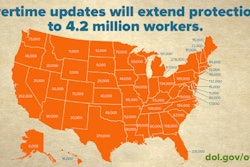
The International Warehouse Logistics Association (IWLA) has filed suit alongside a coalition of trade associations and the U.S. Chamber of Commerce in opposition of the U.S. Department of Labor’s (DOL) overtime rule. The suit, filed in the U.S. District Court for the Eastern District of Texas on Sept. 20, questions the statutory authority of the DOL under the Administrative Procedure Act.
The Obama Administration in May announced the details of new labor rules to increase the salary cutoff for overtime pay, Food Logistics reported. Although the plan was outlined a year previously, many employers say the change will be a challenge to small businesses that pride themselves on an entrepreneurial culture.
“Not only is the DOL overreaching its authority by implementing the rule, but the rule itself has increased the salary threshold to be excessively burdensome,” says IWLA president and CEO, Steve DeHaan. “Warehousing and logistics creates new jobs every day. As it stands the overtime rule will hinder this creation and decrease upward mobility in this sector. IWLA will do whatever it takes to fight the DOL’s unjustified actions,” says DeHaan.
At the heart of the issue is the unprecedented more than 100-percent increase to the minimum salary threshold – from $455 per week to $913 – resulting in a greatly limited workplace flexibility and increased labor costs for businesses across the country. The new rule also promises an ongoing increase to the salary threshold every three years.
The rule, which falls under the Fair Labor Standards Act, is predicted to create an unfair job market, IWLA claimed. “The Fair Labor Standards Act was created to promote fair and honest labor protections for workers. The outcome of this rule could very well have the opposite effect, as business owners scramble to reduce pay and overtime hours. And this will impede employees from advancing to higher positions as employers try to keep additional expenses at bay,” DeHaan says.
The overtime rule is scheduled to take effect on Dec. 1, 2016.
















